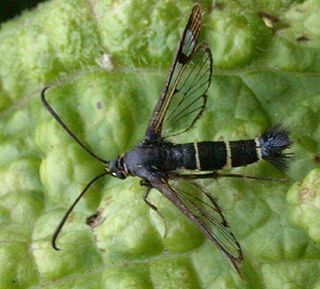
The Sesiidae or clearwing moths are a diurnal moth family in the order Lepidoptera known for their Batesian mimicry in both appearance and behaviour of various Hymenoptera.

The hornet moth or hornet clearwing is a large moth native to Europe and the Middle East and has been introduced to North America. Its protective coloration is an example of Batesian mimicry, as its similarity to a hornet makes it unappealing to predators. The hornet moth has been linked to the large dieback of poplar trees across Europe because its larvae bore into the trunk of the tree before re-emerging as adults.

Synanthedon culiciformis, known as the large red-belted clearwing, is a moth of the family Sesiidae. It is found in the Palearctic and Nearctic realms.

Synanthedon vespiformis, the yellow-legged clearwing, is a moth of the family Sesiidae. It is found in the Palearctic realm.

Bembecia ichneumoniformis, the six-belted clearwing, is a moth of the family Sesiidae.

Synanthedon andrenaeformis, the orange-tailed clearwing, is a moth of the family Sesiidae. It is known from most of Europe. It is also present in the Near East.
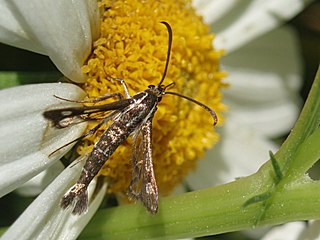
Pyropteron muscaeforme, the thrift clearwing, is a moth of the family Sesiidae. It is known from most of Europe. A small member of its genus, the wingspan is 15–18 mm. It is further distinguished by narrow clear (transparent) spaces on the blackish, or bronzy, forewings. There are three whitish bands on the body, and traces of a whitish line along the middle of the back.

Microsphecia brosiformis is a moth of the family Sesiidae. It is found from the Balkan Peninsula to the Crimea, southern Russia (Sarepta), Asia Minor, the Caucasus, Iran, Turkmenistan and Afghanistan.

Synanthedon stomoxiformis is a moth of the family Sesiidae. It is found in most of Europe and the Middle East.

Bembecia scopigera, the six-belted clearwing, is a moth of the family Sesiidae. It is found from central Spain over most of south-western and central Europe, the Balkans, Greece, southern Russia and Ukraine to Turkey.

Pyropteron triannuliformis is a moth of the family Sesiidae. It is found from most of Europe to the Near East and Central Asia.

Chamaesphecia masariformis is a moth of the family Sesiidae. It is found in south-eastern Europe, Turkey, northern Iran, the Middle East, the Caucasus, southern Russia, Uzbekistan and Tajikistan.
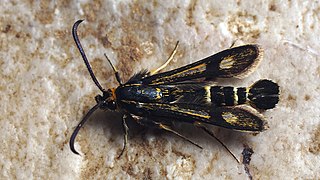
Chamaesphecia nigrifrons is a moth of the family Sesiidae. It is found in central and south-eastern France, Corsica, Luxembourg, South Belgium, south-western Germany, Austria, south-eastern Czech Republic, eastern Slovakia, Hungary, Croatia, Slovenia, former Yugoslavia, Serbia, southern Republic of Macedonia, Bosnia and Herzegovina, Bulgaria, northern Romania, northern Greece, southern Ukraine, Transcaucasia, north-western and southern Turkey and north-western Syria.

Paranthrene insolita is a moth of the family Sesiidae. It is found in large parts of Europe, Turkey, Iraq, the Levant, Israel and the Palestinian Territories.
Pyropteron affine is a moth of the family Sesiidae. It is found in most of Europe, except Ireland, Great Britain, the Netherlands, Denmark, Fennoscandia, the Baltic region, Poland and Bulgaria. It is also found in Asia Minor, Georgia, the Middle East and North Africa.

Synanthedon cephiformis is a moth of the family Sesiidae. It is found in Central Europe and Eastern Europe.
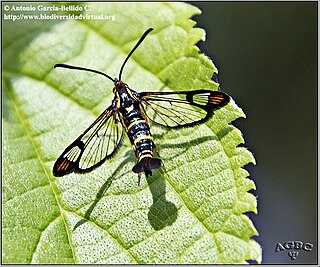
Synanthedon conopiformis, Dale's oak clearwing, is a moth of the family Sesiidae. It is found in almost all of Europe, except the north.
Synanthedon mesiaeformis is a moth of the family Sesiidae. It is found in France, Spain, Lithuania, Poland, the Czech Republic, most of the Balkan Peninsula, Finland, Russia and Asia Minor. The species prefers solitary trees on meadows, in parks and along streams.

Synanthedon scoliaeformis, the Welsh clearwing, is a moth of the family Sesiidae. It is found from almost all of Europe, east through Russia to Japan.
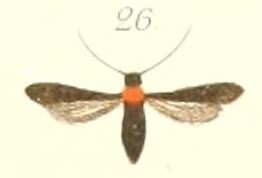
The Tinthiinae are a subfamily of clearwing moths, first established in 1917 by Ferdinand Le Cerf.














